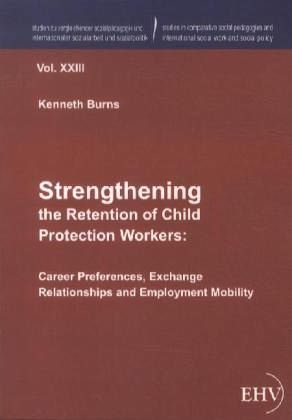
Strengthening the Retention of Child Protection Workers
Career Preferences, Exchange Relationships and Employment Mobility
Versandkostenfrei!
Versandfertig in 6-10 Tagen
44,90 €
inkl. MwSt.

PAYBACK Punkte
0 °P sammeln!
This book examines a key issue in the field of human and social services: how to retain workers in child protection and welfare organisations. Research over the last decade has highlighted the turnover of these workers as being a pressing and perennial issue that impacts upon service users, staff welfare, resources and the reputation of this sector. This book presents the findings of a study examining social workers retention in child protection and welfare. The findings from this study highlights how workers retention is influenced by exchanges relationships with colleagues and managers, and ...
This book examines a key issue in the field of human and social services: how to retain workers in child protection and welfare organisations. Research over the last decade has highlighted the turnover of these workers as being a pressing and perennial issue that impacts upon service users, staff welfare, resources and the reputation of this sector. This book presents the findings of a study examining social workers retention in child protection and welfare. The findings from this study highlights how workers retention is influenced by exchanges relationships with colleagues and managers, and this book presents a unique career preference typology which expands our understanding of how workers make decisions to stay or leave based upon their pre-conceptions of career pathways post-qualification. The book also examines findings associated with the employment mobility of these workers within child protection and tracks their next post after leaving, which provides some surprising findings regarding how we understand and measure turnover for these workers. The book also examines rich qualitative data from these workers experiences of being a social worker in child protection associated with; job satisfaction, commitment to child protection and welfare work, making a difference, quality of supervision, autonomy, and exchange relationships with peers, all of which emerged as important factors in social workers decisions to stay or leave. The implications of this study s findings for theory are also explored.
Kenneth Burns is deputy course director of the Master of Social Work and a research associate with the Institute for Social Science in the 21st Century at University College Cork, Ireland.
Kenneth Burns is deputy course director of the Master of Social Work and a research associate with the Institute for Social Science in the 21st Century at University College Cork, Ireland.














